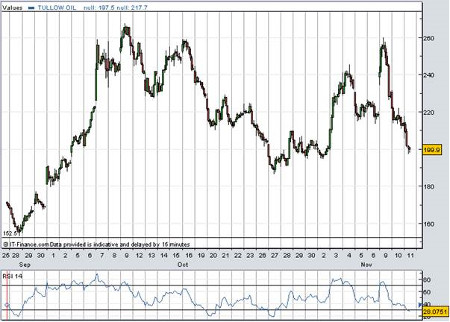Tullow Oil rebound fizzles out
11th November 2015 13:35
by Harriet Mann from interactive investor
Share on
In a nod to the growing acceptance that oil prices will likely stay lower for longer, has tightened its belt again and slashed 2016 capital expenditure plans further. Its focus on West African assets and balance sheet protection is welcome, and M&A rumour refuses to go away. That huge debt pile is a real turn-off, though, and this operational update does nothing to improve the outlook
Average production in West Africa should now be 66-67,000 barrels of oil per day (bopd) in 2015, in line with City forecasts but at the bottom of the company's 67-70,000 range. Tullow's Jubilee field, offshore Ghana, is on track to meet its 100,000 bopd target, despite restricted gas exports over the summer. VSA Capital thinks the 33,000 bopd net to Tullow during the third-quarter is "encouraging".
When the oil company's Ghanaian TEN project is complete - first oil is still expected mid-2016 - Tullow's West African oil assets will be pumping around 100,000 barrels of the black stuff from the ground each day in 2017, net to the company.
Revenue and cost of sales are in line with expectations for this year, and Tullow expects to generate pre-tax operating cash flow before working capital of around $1 billion and end 2015 with net debt at around $4.2 billion.
But it's this debt pile that's a real stinker. Yes, TEN will start generating cash in time and Maersk’s entry into Kenya via a farmout agreement with is good news for Tullow's own assets in the region. But analysts at Investec believe that even if Tullow were to deliver an identical deal, it would not be enough to rebalance its capital structure.
"This reinforces our view that a significantly higher oil price or fresh capital (as well as a partial Kenyan divestment!) is required for Tullow to fully deleverage," writes the broker. "As a result, with the shares already discounting c$70/b, we reiterate our Sell."

(click to enlarge)
That perhaps explains today's share price reaction, but Tullow is at least doing all it can to make things work. This year's capital investment budget is in line at $1.9 billion, while next year's is at the lower end of its forecast at $1.2 billion. Tullow still has access to $3.7 billion of debt, with $1 billion available under the corporate facility. This will also help with the development of its East African projects in Kenya and Uganda, expected to complete in 2017.
In line with the behaviour of most companies in the oil sector, Tullow is trying to cut costs: its "major simplification" project will cost around $40 million this year, but should save $500 million over three.
"This trading update has not brought up anything particularly surprising. Despite the operational progress made by TLW in West and East Africa, as well as better costs management including less exploration expenditures, investor sentiment has remained negative mainly due to low oil prices," notes VSA Capital. "However, TLW’s share price has recently benefited from M&A speculation following the acquisition by Maersk Oil of Africa Oil’s stakes in five east African oil blocks for cUS$845m. TLW holds 50% [working interest] on four of them."
Tullow shares have already plummeted by three-quarters since May 2014, and Deutsche Bank reckons they're worth 230p. But a further 7% slump Wednesday to 198p suggests traders are unwilling to price in further project success without either an uptick in oil prices, or cash injection.
We'll get another operational update on 13 January ahead of full-year results on 10 February.
This article is for information and discussion purposes only and does not form a recommendation to invest or otherwise. The value of an investment may fall. The investments referred to in this article may not be suitable for all investors, and if in doubt, an investor should seek advice from a qualified investment adviser.